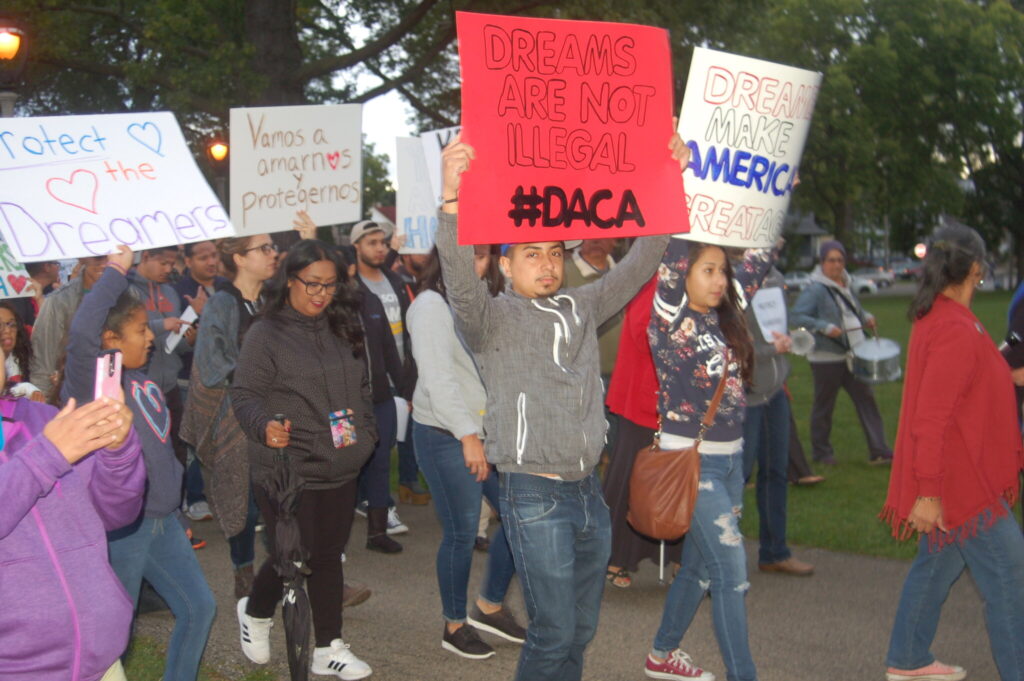Wisconsin Students Face Uncertain Future After Latest DACA Ruling
"Dreamers" have been forced to live life in limbo following repeated federal court rulings.

Hundreds of DACA supporters marched at Walker Square Park in 2017 when the program was also threatened. (NNS file photo)
Local college students are among hundreds of thousands nationwide who have faced uncertainty since a federal judge in Texas ruled last month that the Deferred Action for Childhood Arrivals, or DACA, program is illegal.
The ruling bars the government from processing new applications and puts those already enrolled in the program for young immigrants at risk.
Among them is Alma Sandoval, 21, a senior at Marquette University who is majoring in social welfare and justice.
She said she put her decision on whether to attend graduate school on hold.
“It’s sad because there are so many people out here wondering what they are going to do if the program ends,” Sandoval said.
The DACA program prevents eligible individuals who came to the U.S. as children and were under the age of 31 by June 15, 2012, from being deported. It also provides work authorization for a period of two years.
Many of the program’s more than 800,000 recipients have utilized DACA as a pathway to higher education since it was established in 2012.
Federal ruling
In September, U.S. District Judge Andrew Hanen ruled in support of Texas and eight other states that sued to stop DACA and deemed the current version of the program illegal.
The states said DACA caused financial harm and is unconstitutional. Hanen’s ruling did not mandate the federal government to act on current DACA recipients, who often are referred to as Dreamers.
But it set into motion a chain of events that will likely result in the program’s fate being decided by the U.S. Supreme Court.
It would be the third time the high court has been called upon to make a ruling on the program.
‘A lot of stigma’
Fatima Jimenez Gonzalez, 21, is a DACA recipient and the president of the Marquette Dreamers. She and Sandoval helped launch the organization to provide a support system for DACA recipients and other children of immigrants and to educate the Marquette community on the issues they face.
“There’s a lot of stigma for immigrants, and many of us are unable to work legally to support ourselves,” she said.
Jimenez Gonzalez, who came to Milwaukee from Mexico at age 2 with her seven siblings and parents, said immigrants at Marquette and elsewhere are misunderstood.
“Take a closer look,” she said. “We go to work. We pay taxes,” she said. “Look at us as people instead of as a statistic.”
Another member of the group, Nestor Ruelas, a 21-year-old junior at Marquette, isn’t enrolled in DACA but said the ruling adds to the many challenges immigrants already face.
Ruelas, whose family came to Milwaukee from Jalisco, Mexico, when he was 6 months old, said he hopes to go to law school eventually and open up an immigration law firm and advocate for immigrant’s rights.
“I just want everyone to have a fair chance at life,” he said.
Helping undocumented students
Maria Tijerina, a graduate student at Marquette and the Inclusive Excellence Graduate Fellow for the university’s Office of Institutional Diversity and Inclusion, works with undocumented students.
She said she helps them — some of whom are DACA recipients– learn the nuances of immigration laws in the U.S. and how to access scholarships and other opportunities.
“A lot is helping provide the knowledge and understanding about what being undocumented and documented is and what it means to be a Dreamer,” said Tijerina, who moved to Wisconsin from Monterrey, Mexico, with her family as a child. “There are many legal implications of being undocumented.”
In terms of DACA, she said students are fearful about the program’s future.
“DACA opened up so many opportunities for immigrants and communities and helped the economy in the U.S., allowing everyone to reap the benefits,” Tijerina said.
Cain Oulahan, whose firm Oulahan Immigration Law provides services related to DACA, said he hasn’t fielded many calls about the program since the ruling.
He said he would expect his phone to ring off the hook if the program gets eliminated.
Despite the fact that applications are not being processed, Oulahan said the risks likely outweigh the benefits.
The government “might accept it later,” Oulahan said. “If you file it and they ultimately take away DACA, your information is on file with immigration now, so there is a risk in doing that.”
The real problem, he said, is the lack of federal immigration reform. It’s an issue that has challenged immigrants for years, he said.
“Our laws are outdated, and there are no better options for Dreamers than DACA,” Oulahan said.
Until there is a true pathway for legal status for immigrants, he said, people will continue to face backlash.
As for Sandoval, she said she’s now accustomed to legal challenges related to her immigration status but plans to move forward regardless.
“It’s something I’m always aware of,” she said. “I feel like DACA Dreamers will always hope for a pathway to citizenship, and it will always be a fight.”
Students grapple with uncertain futures after latest DACA ruling was originally published by the Milwaukee Neighborhood News Service.






















Texas ruling is biased to say the least. Republicans continue to abuse DACCA for political gain. It’s clearly a “wedge issue” to get votes. Their Divide & Conquer strategy is escalating White Nationalism, aka, Supremacy.